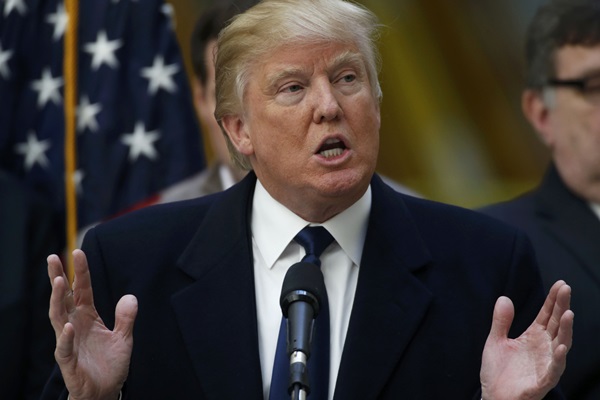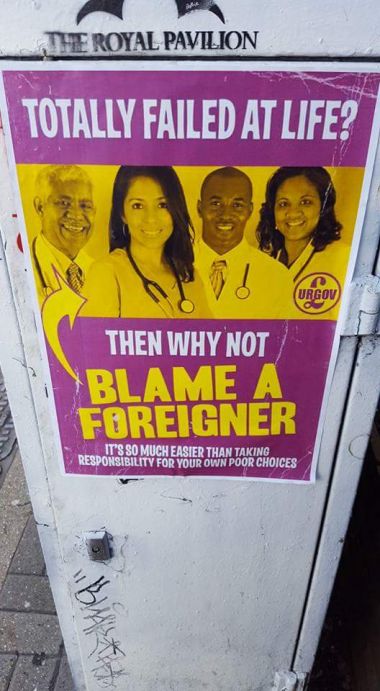Stop saying Trump supporters are stupid and start dealing with the issues

When the results of the 2015 UK General election were announced, there was bemusement, whichever side you were on. Virtually no opinion polls had predicted that the Conservatives would win their first majority since 1992. Political reporters, pollsters and commentators were baffled.
In the post mortem, one of the most interesting bits of analysis was the way in which social media had conditioned us into only listening to our own tribe. So, left-wing people only follow lefties, while right-wingers huddle together too. The echo chamber seems to work in other spheres too – new atheists following other new atheists only, while evangelicals stick to their own kind etc.
As someone who's very sure of my own political persuasions (and other opinions too!) I've always found this very odd. Since social media took off nearly a decade ago, I've always followed people and organisations with whom I disagree. In fact, some of my best interactions have been with those whose opinions I don't share. I try to live this way in life too – I want to be in dialogue with people who aren't like me. I'm northern, white, middle-class, educated, straight, able-bodied, male, English, British, Christian, evangelical, catholic, Anglican and a number of other things. But I want to interact with lots of people who aren't any of these.
What has any of this got to do with Donald Trump? Well, apart from the fact that one in every two articles on the internet right now is about him, treatment of Trump supporters are a case in point. This week, a friend shared this meme:

It's designed to do two things as far as I can tell. One is a simple case of virtue signaling – the process whereby people indicate that they have the 'correct' and 'acceptable' viewpoint on any given matter. In this instance, the received wisdom of much social media is that Donald Trump is uniquely bad and that as much scorn as possible needs to be poured on him and his supporters. Virtue signaling is an easy job – it doesn't require any organising or campaigning against the bad guys – just share a meme or tweet your opinion and you will look fine. Frankly, we're probably all guilty of it at times.
The second purpose of the meme is more sinister. It's elitist sniping at anyone who votes for Trump, without any examination of why that person might do so. It's judgment shorn of empathy, context or analysis. It says, "The only possible reason you could have for voting for Trump is that you're intellectually inferior to me."
This is just obviously untrue – yet it's where the social media echo chamber really shows itself. If you rarely interact with anyone who is a Trump voter, you're unlikely to realise why they are voting that way. A slew of articles have been written about the Trump phenomenon, thousands of memes have been shared and videos of various appalling events both involving and surrounding the candidate himself have gone viral. But very, very few of these have got close to analysing why someone might consider voting for Trump.
There are honourable exceptions of course. This excellent piece from the Guardian shows why Trump is thriving in the wake of the evisceration of American blue-collar industry. "A map of his support may coordinate with racist Google searches, but it coordinates even better with deindustrialization and despair, with the zones of economic misery that 30 years of Washington's free-market consensus have brought the rest of America."
This BBC piece interweaving the music of Bruce Springsteen and the disastrous decline of the American middle and working classes also gets closer to the heart of the problem, "Forty years of hurt have driven some people to answer Springsteen's question, that the American dream is something worse than a lie, and from that bleak answer they are looking for a political leader who echoes their anger."
This isn't just an American phenomenon though. In the UK, the closest equivalent to Trump (although some distance short) is Nigel Farage, the leader of the United Kingdom Independence Party. In a similar vein to which Trump's supporters are cast as intellectually deficient, is a recent poster campaign against UKIP. "Totally failed at life? Then why not blame a foreigner" the poster smugly proclaimed.

This astonishingly vacuous sentiment might have a tiny kernel of truth in it – some UKIP supporters have racist views, just as some Trump supporters do. But to extrapolate that everyone who supports Trump, or UKIP is a racist is as lazy as it is inaccurate.
Firstly it ignores the socio-economic conditions into which UKIP has had relative, (and Trump phenomenal), success. How churlish to suggest that someone would support a populist candidate because they've 'failed at life.'
Ironically of course, it buys into the same neo-liberal framing of the world that has wrought economic devastation in the first place. It sees us all as isolated, individual units and our own success or failure is determined by our individual actions – rather than the economic climate into which we are born and raised.
None of this is to say that I support Trump, or indeed UKIP (or that anti-intellectualism isn't a problem – it is). Trump's a quack and a conman and I hope he's found out sooner rather than later. He's flirted with fascistic concepts and some of his rallies have come dangerously close to Nuremberg-style imagery. Trump's absurd declarations deserve to be treated with contempt. But his supporters don't. Some of them are racists and should be challenged, some of them are ignorant and need calling out. Yet many of them have genuine concerns with America's utterly broken political-economic system that need to be dealt with, and patronising them won't help – it will just further the alienation that's fuelling the Trump train in the first place.











